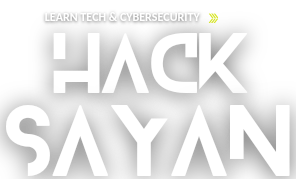hack@sayan
Python Programming Courses for Penetration
- 4.721 students
- Last updated 25/7/2023
Descriptions
This course will teach you Python scripting and its application to problems in computer and network security. This course is ideal for penetration testers, security enthusiasts and network administrators who want to learn to automate tasks or go beyond just using ready made tools. We will be covering topics in system security, network security, attacking web applications and services, exploitation techniques, malware and binary analysis and task automation.

Key Points
- Python Scripting – Language Essentials
- System Programming and Security
- Network Security Programming – Sniffers and Packet Injectors
- Attacking Web Applications
- Exploitation Techniques
- Malware Analysis and Reverse Engineering
Course Modules
Week 1-2: Introduction to Python and Scripting Basics
Introduction to Python: History, features, and its relevance in penetration testing.
Setting up the Python environment: Installing Python, using virtual environments.
Python syntax and data types: Variables, strings, numbers, lists, tuples, dictionaries.
Control structures: if, else, elif statements for decision-making.
Week 3-4: File Handling and Text Processing
Reading and writing files: Opening, reading, writing, and closing files.
Text manipulation: String operations, regular expressions for pattern matching.
CSV and JSON data: Reading, writing, and parsing structured data.
Working with binary data: Reading and writing binary files.
Week 9-10: Web Scraping and API Interaction
Web scraping fundamentals: Extracting data from websites using libraries like BeautifulSoup.
Parsing HTML and XML: Navigating and extracting information from structured documents.
API interaction: Sending requests to APIs, handling JSON responses, authentication.
Ethical considerations: Responsible scraping and API usage, avoiding excessive requests.
Week 11-12: Data Manipulation and Analysis
Data manipulation with pandas: Reading, filtering, and transforming tabular data.
Data visualization: Using libraries like Matplotlib to create graphs and charts.
Data analysis: Performing basic statistical analysis on collected data.
Integration with databases: Connecting to and querying databases using Python.
Week 13-14: Security Automation and Tools Development
Working with passwords and secrets: Securely storing and handling sensitive information.
Writing custom tools: Developing penetration testing utilities and scripts.
Exploitation and post-exploitation scripts: Automating parts of the penetration testing process.
Security assessment automation: Scripting vulnerability scanning and reporting
Week 15-16: Advanced Topics and Practical Projects
Multithreading and multiprocessing: Parallelizing tasks for improved performance.
Reverse engineering scripts: Analyzing malware, disassembling code, and extracting indicators.
Cryptography basics: Introduction to encryption, decryption, and hashing in Python.
Final project: Students design and implement a complex penetration testing script.
Week 17-18: Guest Lectures and Integration with External Tools
Inviting experts: Guest lectures on real-world applications and challenges.
Integrating with other tools: Calling external command-line tools from Python scripts.
Collaborative scripting: Using version control (e.g., Git) for team-based projects.
Code optimization and review: Enhancing performance and reviewing peers' code.
Week 19-20: Ethical Considerations, Final Projects, and Wrap-up
Ethical hacking considerations: Discussing responsible scripting, legality, and ethical use.
Presenting final projects: Demonstrating and discussing students' penetration testing scripts.
Peer evaluation and feedback: Reviewing classmates' projects and providing feedback.
Course conclusion: Recap, Q&A session, and providing resources for further learning.
Note: . This syllabus can be adapted based on the course duration, participants' background, and specific learning objectives. Practical exercises, labs, and real-world scenarios are crucial for a hands-on learning experience for penetration testers.
Instructor

Owner
This course includes:
- 62 hours on-demand video
- Full lifetime access
- Access on mobile and TV
- Free Webinar
- Certificate of completion














